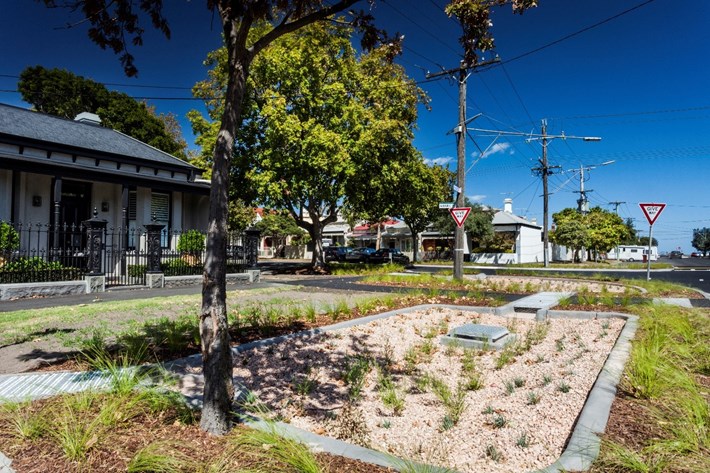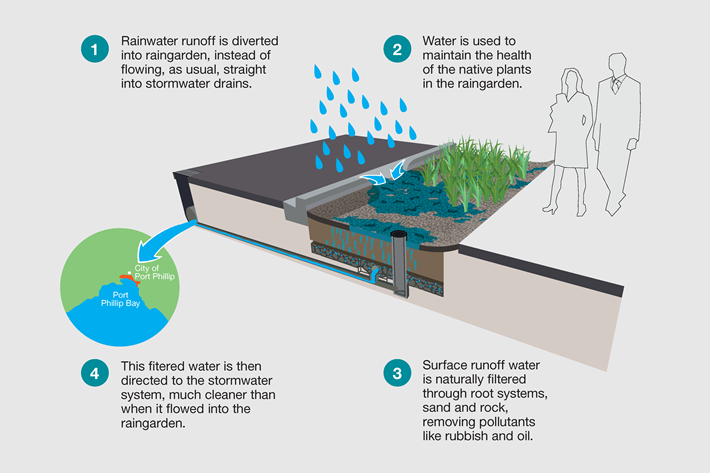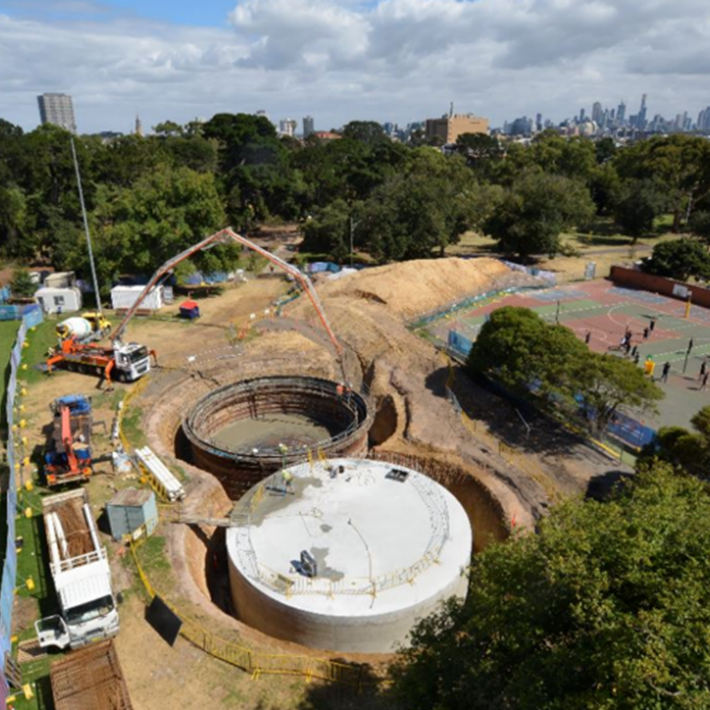A water sensitive City
What we’re doing
Investing in our assets
- Increasing investment in maintenance, mapping, upgrades and modelling of our drainage network. Stormwater inspection teams use robotic technology to monitor and maintain 236 km of stormwater channels
- Upgrading our irrigation infrastructure and buildings to maximise water efficiency
- Constructing raingardens in our streets and parks
- Increasing permeable surfaces that allow water to drain more easily in Council’s streets and public spaces
- Investigating new stormwater harvesting projects to clean water and reduce potable water use.
Working with our community and partners
- Collaborating with Melbourne Water and partners to deliver the Elster Creek Flood Management Plan. This includes investigating drainage upgrades to reduce flooding in Elwood.
- Partnering with and funding the EcoCentre to deliver projects and volunteering initiatives that protect and enhance the waterways that feed into the Bay.
Changing how we deliver our services
- Introducing new requirements for developments to increase permeability and detain stormwater to reduce flooding and improve water quality
- Minimising water used to maintain our public spaces, including using a new centralised irrigation control system and requiring reporting on water use.
What we have done
Recent examples of how we are conserving our water supply and improving the quality of water entering Port Phillip Bay:
- 200+ raingardens constructed in streets across the City to clean water before it enters the Bay.
- Developed the Fishermans Bend Water Sensitive City Strategy with the Victorian Government, City of Melbourne, South East Water and Melbourne Water. It aims to reduce the impact of flooding, clean stormwater before it enters the bay and provide a climate-resilient water supply for the community.
- Built the Alma Park Stormwater harvesting Scheme which provides 16 megalitres per year of clean stormwater for irrigation of the gardens. It also removes 78 kg/yr nitrogen, 13 kg/yr of phosphorus and 8772 kg/year of total suspended solids.
Background
Victoria’s temperature has steadily increased since the 1970s and overall, water in rivers and streams has decreased by around 50 per cent over the last 20 years. 2019 was Victoria’s hottest and driest year on record.
The combined challenges of climate change and population growth mean that Council must find new and innovative ways to manage water.
Council’s Water Sensitive Urban Design Programs
Water Sensitive Urban Design (WSUD) is a term used to describe how to manage the whole water cycle to avoid, or at least minimise, the environmental impacts of urbanisation and climate change on the water cycle.
There are a number of ways we use water sensitive urban design to conserve water and improve water quality in Port Phillip.
Raingardens
We have installed over 200 raingardens to improve the quality of water entering Port Phillip Bay.
Raingardens are a natural filtration system that cleans stormwater runoff from the street before it enters our stormwater drains and eventually the bay. Raingardens help improve water quality by trapping litter and filtering invisible pollutants. Once clean, the water leaves the raingarden through a pipe below the soil into the stormwater drain and then into the bay.
Raingardens are also used to slow the flow of stormwater to protect aquatic habitats and reduce the risk of flooding.

Raingarden in Park Road, Middle Park

Stormwater harvesting to irrigate our parks
Stormwater harvesting systems collect, clean and store stormwater for reuse, generally for irrigation. Using stormwater from our drains means we can save precious drinking water. These systems also reduce the flow of water and pollutants entering our waterways and the bay.
Council uses stormwater for irrigation from two stormwater harvesting schemes.
The Elsternwick Park Stormwater Harvesting Scheme (a partnership with Bayside City Council) allows us to use up to 30 million litres of harvested stormwater to irrigate Elwood Park annually.
In 2019, we completed the Alma Park Stormwater Harvesting Scheme, which can deliver up to 18 million litres of water for use in Alma Park.
Not only do these schemes provide significant reductions to Council’s mains water consumption, they also provide resilience in times of drought and cleanse stormwater, contributing significantly to the protection of the Bay.

Alma Park Stormwater Harvesting Scheme during construction in 2019.
Water efficiency
To conserve our drinking water, City of Port Phillip has installed water tanks on Council buildings, water-efficient appliances and fittings in our buildings, and is improving how we manage our irrigation network to keep our parks and open spaces green more efficiently.
Other
To help reduce flooding, we find ways to minimise the amount of stormwater entering the drainage system from hard surfaces such as roads, footpaths and roofs by removing concrete and asphalt where possible, and directing water to irrigate trees and vegetation instead.
We also hope to use the future recycled water network, planned for Fishermans Bend, to irrigate parks, trees and vegetation in the surrounding area.
Water sensitive design in new developments
Council’s Planning Scheme requires planning applicants to demonstrate how the proposed development incorporates best practice water sensitive urban design by submitting a Stormwater Management Assessment.
Find out more about sustainable design.